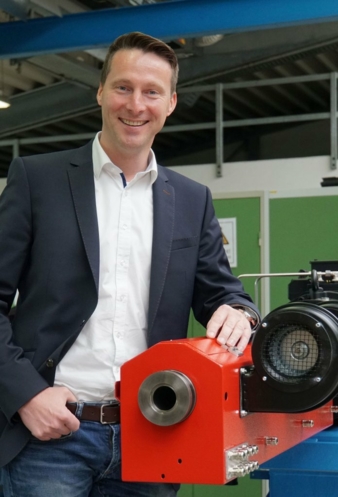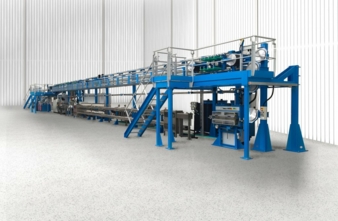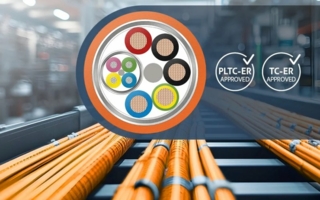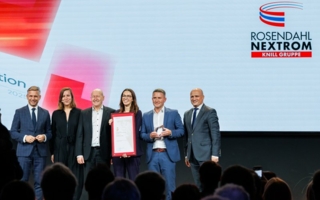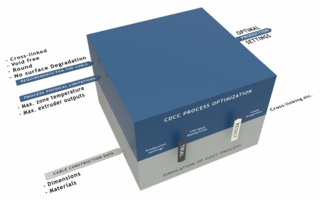13/01/2020
From single parts to complete production lines
The German Kurre Group develops solutions for almost all industries. Core business areas include machines for the production and processing of cables. In fact, the group is an innovation driver in this field and the concept certainly seems to be taking hold. Since the 1980s, the enterprise has hardly been affected by economic ups and downs.
“We make everything you can produce yourself,” says Stefan Plaggenborg, Managing Partner of the Kurre Group, which comprises the independent companies Kurre Spezialmaschinenbau, Siebe Engineering, Kutec and Kurre Tooling. They all have one business objective in common: the development, design and manufacture of machinery for all aspects of cable production, as well as electrical engineering and the subcontracting of steel and sheet metal parts. In other words: the group has production covered from all angles. The added value for mechanical components is around 90%. Construction parts are manufactured in-house and semi-finished products such as plates, sheets, profiles and C-parts are likewise kept in-house. This creates freedom and short delivery times.
In 1979, Mr Reinhold and Mrs Elisabeth Kurre established the company in Harkebruegge/Germany, which traded under the name “Metall- und Maschinenbau Kurre”. Only three years later, the company moved to the neighbouring industrial area of Ramsloh, and in 1986 “Spezialmaschinenbau Kurre” was founded. Business developed well: 1989, 1997, 2001 and 2007 saw the construction of further production and office buildings. Behind the “top dogs” in wire and cable production – Rosendahl, Niehoff and Troester – Kurre had already made it into the solid midfield by the end of the 2000s. 90 employees generated around EUR 9m in turnover in a production area of 5,000m².
Plaggenborg joined the company in 2009. After five years of training by the company founders, he and his wife Silke took over the group as successors. Since then, the numbers have continued to rise: in 2014, the group had 140 employees, 6,000m² and a turnover of EUR 13m. By 2017, the numbers had increased to 180 staff, almost 8,000m² and a turnover of EUR 24m. Siebe Engineering in Neustadt/Wied was added at the beginning of 2018. The company is a leading machine manufacturer in the field of plastics processing and primarily develops extrusion lines. According to Stefan Plaggenborg, Siebe is an excellent complement to the group’s portfolio. Today – at the end of 2019 – the group has over 220 employees, 10,000m² of production space and serves 500 customers worldwide.
Up to 90% in-house production
One of the company’s selling points is that there is a member of staff behind every screw. Plaggenborg confirms that the customer benefits from tailor-made solutions with nothing “off the peg”. Customised product series are ultimately often cheaper and better than Chinese products. Examples include
– Foam extruders
– Wrapping lines
– Tapers.
“Our customers’ expertise is sacred to us: what was developed together remains exclusive,” the managing director points out.
But the group is not just limited to one industry. Expressed as a percentage, the group’s customers break down into the following sectors:
– 40% in the automotive industry and its suppliers
– 30% in the production of cables below medium voltage
– 20% in the production of cables for data transmission/fibre optic cables
– 10% in medical technology and aviation.
In 2019 alone, Kurre built twelve extrusion lines. That is twice as many as in 2018.
The question is: in which areas should the company try to develop its business? Plaggenborg expects to see 30% growth over the next five years, ensuring all the while that the ratio of turnover to contribution margin remains sound.
And from a technical point of view? The basic principle is to remain flexible and curious, to look ahead and also to the side. After all, nobody can know where the economy – and in particular the automotive industry – is heading: E-mobility? Cars with combustion engines for fossil fuels or hydrogen? Fuel cell? Basically, it doesn’t really matter as the Kurre Group will always be ready to respond.
Plaggenborg is an energy electronics engineer through and through. In his youth, he completed an apprenticeship at a company that now belongs to Leoni. Since then, he has remained loyal to the wire and cable industry - apart from a ten-year detour through the aviation industry. He has a passion for technology and is always thinking about possible solutions. His vision for his company group is to be a supplier that listens to its customers and their needs, making anything possible from individual parts to complete production lines. Other companies also make this claim. What is it then, that makes Kurre better than other companies? "We stay with the project until it is up and running," emphasises Plaggenborg. And for those who think this sounds too simple, he repeats: “Kurre makes the customer's concern its own. And that's what the market wants to hear, and that’s how we do things here...”
The innovative capacity of technical enterprises is usually indicated by their expenditure on research and development. According to the Federal Statistical Office, Germany’s mechanical engineering industry invests an average 3% of turnover in R&D. This compares with 10% for Kurre, whose company director reveals that this figure also includes completely new developments designed on behalf of customers. Excluding these, the percentage still amounts to around 5% – and thus more than the industry average. In the realm of R+D, the group works together with RWTH Aachen University as well as universities and technical colleges in Emden, Bonn, Koblenz, Osnabruck, Siegen and Jade-Hochschule Wilhelmshaven.
10% of sales go to R+D
This has given rise, for example, to a development by Siebe Engineering: an electronically controlled bypass for foam extrusion that reduces start-up scrap to a minimum. It takes considerable ingenuity to even come up with such an idea.
Plaggenborg points out that the creativity and expertise of the employees is key. They are as qualified as they are young with the average age totalling 38. In this respect, he himself belongs to the golden oldies. A quarter of the workforce are trained engineers with 25 working in design. Production is managed solely by skilled workers and technicians. Kurre trains apprentices in fields such as mechatronics, precision mechanics, technical product design and metal construction. With a current total of 30 trainees, almost seven qualify every year. The retention rate is relatively high. The first apprentice – trained in the 1980s – is still working at the Saterland plant today.
And the group continues to expand. So far, Plaggenborg's approach seems to be paying off. This was also reflected at the Düsseldorf industry show "wire". In 2018, the group moved to a larger 165m² stand in Hall 10, manned by 20 members of staff. The original 65m² area in Hall 9 was too small and the five consultants too few to handle all enquiries.
wire 2020, Hall 10 Stand B 22
Company group Kurre
Industriestrasse 5
26683 Saterland-Ramsloh/Germany
Contact person is Mr. Stefan Plaggenborg
Tel.: + 49 4498 9250-0
info@kurre.net
www.kurre.net

